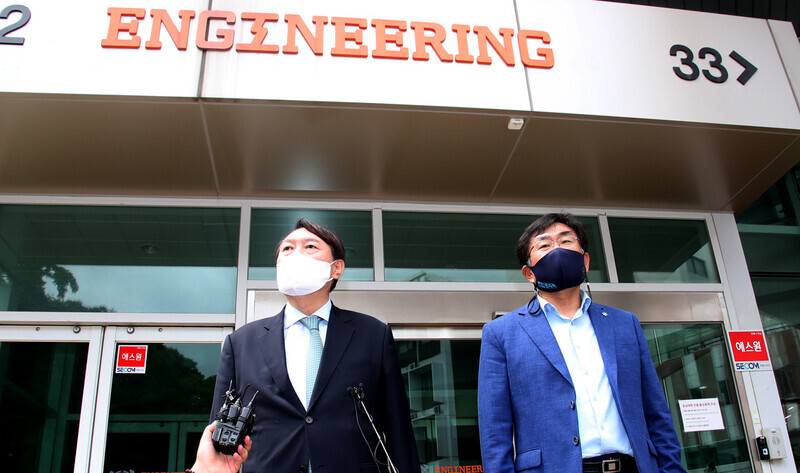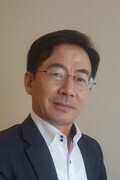hankyoreh
Links to other country sites 다른 나라 사이트 링크
[Column] Why S. Korean conservatives are obsessed with nuclear energy

On March 11, 2011, a mega-earthquake occurred in the waters off of northeastern Japan. As a result, all cooling devices at the Fukushima Nuclear Power Plant were damaged, resulting in runaway nuclear fission. It was the worst nuclear power plant disaster since Chernobyl in 1986.
Foreign residents began leaving Japan in droves. I was working as a Tokyo correspondent at the time, and I can still vividly recall the palpable sense of fear running through the public’s somber silence.
From what we understand today, it was a sheer fluke that the accident stopped where it did. Then-Prime Minister Naoto Kan would recall, “We nearly saw half of Japan’s territory go up.”
Ten years have passed since then. What do Japanese people think of nuclear power today?
On March 2, the NHK network reported on the results of 2,311 people’s answers to that question. The most frequent answer given — by 50% of respondents — was that Japan’s use of nuclear power “needs to be reduced.” Another 24% advocated keeping the status quo, 17% supported doing away with nuclear power completely, and 3% supported increasing its use.
In the wake of the accident, Japan suspended all operations at its nuclear power plants, which then accounted for 25% of electricity production. Home electricity fees rose by 25% from 20.4 yen per kilowatt-hour in 2010 to 25.5 yen in 2015.
Surcharges were also applied to promote the use of renewable energy for electricity production. As of this year, a household using 260 kilowatt-hours per month pays the equivalent of around US$94.1 annually.
With the Japanese public now shouldering this burden, NHK put the question to them once again: “Should we put the suspended nuclear power plants back online?”
Just 16% of respondents said yes, while 39% opposed the approach. Another 44% said they weren’t sure. It’s apparent that Japan has learned a harsh lesson from the power plant accident.
For the power companies, resuming nuclear power plant operations would be a windfall.
They have various interest groups hovering in their orbit. For many years, the power companies have been using political funding and advertisements to bring politicians and the media over to their side.
Japan’s ruling Liberal Democratic Party has been working overtime ever since the immediate wake of the Fukushima disaster to get every nuclear power plant they can up and running again. In the past decade, they’ve succeeded in putting nine of them back online.
Tokyo is so intent on dumping contaminated water from Fukushima into the ocean so it can make headway toward a full-scale resumption of nuclear power.
In October 2017, the administration of South Korean President Moon Jae-finalized an “energy transition road map” that included resuming construction on the No. 5 and 6 reactors at the Shin Kori Nuclear Power Plant — but also scrapping all other plans for new plant construction, prohibiting extensions to the working life of antiquated plants, and closing the Wolseong Nuclear Power Plant’s No. 1 reactor ahead of schedule. It was a plan for a 60-year phased transition away from nuclear power.
Giving up nuclear power also means forgoing a lot of immediate interests for the sake of the public’s lives and safety. A minority of people with major interests in nuclear power are using every means at their disposal to prevent that from happening.
Meanwhile, the trend among the general public has been toward a more apathetic disregard for the importance of safety. A rise in electricity charges is all it takes to rattle them.
As feared, “they” have been rallying together under the banner of “stopping the post-nuclear power transition” as the current administration winds down and the next presidential election approaches. They’ve gone into full-scale attack mode, insisting that the energy transition road map has inflicted losses on the South Korean public.
A Board of Audit and Inspection (BAI) audit of the energy transition road map based on a National Assembly Trade, Industry, Energy, SMEs, and Startups Committee vote in September 2019 concluded that the administration had underestimated the economic feasibility of the Wolseong No. 1 reactor.
In a separate audit afterward, the BAI determined that there had been “no violations of the law or procedural flaws.” But after the People Power Party lodged a complaint, prosecutors investigated the matter and eventually referred former Minister of Trade, Industry, and Energy Paik Un-kyu and others for trial, accusing them of involvement in falsification of the Wolseong No. 1 economic feasibility assessment.
Even if there is a re-assessment based on the BAI’s conclusions, the profitability of Wolseong No. 1 would still come out to less than Kori No. 1, which the Park Geun-hye administration decided to shutter in June 2015, citing its diminished economic feasibility.
The argument that the figures were fabricated to reduce the assessment rating so that the plant could be closed early is strained to say the least.
Moreover, the decision to close Kori No. 1 wasn’t just based on its economic feasibility — it also took factors such as safety and public acceptance into account. The prosecutor’s actions during their investigation and indictment come across more as going after these figures with anything they can and accusing them of being “bad guys.”
The conservative media, for their part, have been feeding ordinary Koreans’ anxieties with warnings of “post-nuclear power electric bills” to come. To be sure, electricity charges will end up rising in the intermediate to long term, but as of right now, those claims are simply false.
Nuclear power’s share of electricity generation in South Korea rose from 23.1% in 2018 to 28.8% as of last year — and it’s been growing even more this year. The transition away from nuclear power hasn’t yet begun.
So how do we explain these straw man attacks? I can only think of one answer. To “them,” the earnings and interest far outweigh the public’s lives and safety.
It looks like we’re heading back toward a dirtier world.

By Jeong Nam-ku, editorial writer
Please direct comments or questions to [english@hani.co.kr]

Editorial・opinion
![[Column] Season 2 of special prosecutor probe may be coming to Korea soon [Column] Season 2 of special prosecutor probe may be coming to Korea soon](https://flexible.img.hani.co.kr/flexible/normal/500/300/imgdb/original/2024/0426/3317141030699447.jpg) [Column] Season 2 of special prosecutor probe may be coming to Korea soon
[Column] Season 2 of special prosecutor probe may be coming to Korea soon![[Column] Park Geun-hye déjà vu in Yoon Suk-yeol [Column] Park Geun-hye déjà vu in Yoon Suk-yeol](https://flexible.img.hani.co.kr/flexible/normal/500/300/imgdb/original/2024/0424/651713945113788.jpg) [Column] Park Geun-hye déjà vu in Yoon Suk-yeol
[Column] Park Geun-hye déjà vu in Yoon Suk-yeol- [Editorial] New weight of N. Korea’s nuclear threats makes dialogue all the more urgent
- [Guest essay] The real reason Korea’s new right wants to dub Rhee a founding father
- [Column] ‘Choson’: Is it time we start referring to N. Korea in its own terms?
- [Editorial] Japan’s rewriting of history with Korea has gone too far
- [Column] The president’s questionable capacity for dialogue
- [Column] Are chaebol firms just pizza pies for families to divvy up as they please?
- [Column] Has Korea, too, crossed the Rubicon on China?
- [Correspondent’s column] In Japan’s alliance with US, echoes of its past alliances with UK
Most viewed articles
- 1‘We must say no’: Seoul defense chief on Korean, USFK involvement in hypothetical Taiwan crisis
- 2After election rout, Yoon’s left with 3 choices for dealing with the opposition
- 3AI is catching up with humans at a ‘shocking’ rate
- 4[Editorial] Korea’s surprise Q1 growth requires objective assessment, not blind fanfare
- 5Noting shared ‘values,’ Korea hints at passport-free travel with Japan
- 6Why Kim Jong-un is scrapping the term ‘Day of the Sun’ and toning down fanfare for predecessors
- 7Two factors that’ll decide if Korea’s economy keeps on its upward trend
- 8Amnesty notes ‘erosion’ of freedom of expression in Korea in annual human rights report
- 9The dream K-drama boyfriend stealing hearts and screens in Japan
- 10Yoon says collective action by doctors ‘shakes foundations of liberty and rule of law’